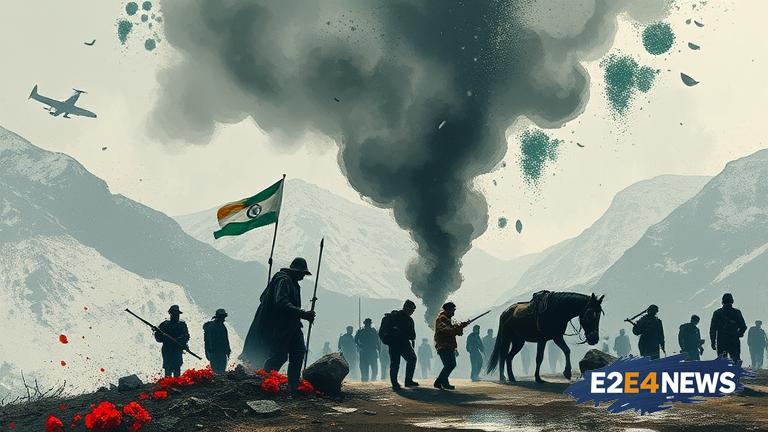The Kashmir region has been under Indian military occupation for six years, with the situation deteriorating rapidly since the abrogation of Article 370 in 2019. The Indian government’s decision to revoke the special status of Jammu and Kashmir has led to a prolonged period of subjugation, with the region’s autonomy being systematically eroded. The Indian military has been accused of numerous human rights abuses, including extrajudicial killings, enforced disappearances, and torture. The region has been placed under a strict curfew, with restrictions on movement, communication, and assembly. The Indian government has also imposed a blanket ban on internet and social media services, making it difficult for the people of Kashmir to access information and communicate with the outside world. The situation has been exacerbated by the COVID-19 pandemic, which has further restricted the movement of people and exacerbated the economic crisis in the region. The people of Kashmir have been subjected to a prolonged period of trauma and stress, with many suffering from mental health issues and anxiety. The Indian government’s actions have been widely condemned by the international community, with many countries and human rights organizations calling for an end to the occupation and the restoration of Kashmir’s autonomy. Despite the international outcry, the Indian government has refused to budge, with Prime Minister Narendra Modi insisting that the decision to revoke Article 370 was necessary to integrate Kashmir into the rest of India. The Kashmiri people, however, remain adamant that they will not accept Indian rule, with many calling for independence and self-determination. The region has a long history of resistance, with many Kashmiris having fought against Indian rule for decades. The current situation is a culmination of years of oppression and marginalization, with the Kashmiri people being denied their basic rights and freedoms. The Indian government’s actions have also been criticized by many Indians, who argue that the occupation is a violation of India’s own constitution and democratic principles. The situation in Kashmir has also had a significant impact on the region’s economy, with many businesses and industries being forced to shut down due to the restrictions. The region’s tourism industry, which was once a major contributor to the economy, has been particularly hard hit, with many tourists canceling their visits due to the unrest. The Indian government has also been accused of using the occupation to exploit Kashmir’s natural resources, including its water and mineral wealth. The region’s environment has also been severely impacted, with many of its natural habitats and ecosystems being destroyed due to the construction of dams and other infrastructure projects. The Kashmiri people have been fighting against the occupation for decades, with many using non-violent resistance and civil disobedience to challenge Indian rule. The region has also seen a significant increase in militant activity, with many groups using armed resistance to fight against the Indian military. The situation in Kashmir is a complex and multifaceted one, with many different perspectives and opinions on the issue. However, one thing is clear: the Kashmiri people will not accept Indian rule, and will continue to fight for their freedom and self-determination. The international community must take notice of the situation in Kashmir and pressure the Indian government to end the occupation and restore the region’s autonomy. The people of Kashmir deserve to live in peace and dignity, with their basic rights and freedoms respected. The Indian government’s actions in Kashmir are a violation of international law and human rights, and must be condemned by the global community. The situation in Kashmir is a humanitarian crisis, with many people suffering from poverty, hunger, and lack of access to basic services. The international community must provide aid and support to the people of Kashmir, and work towards a peaceful resolution to the conflict. The Kashmiri people have the right to self-determination, and must be allowed to decide their own future. The Indian government’s occupation of Kashmir is a threat to regional and global stability, and must be addressed by the international community. The situation in Kashmir is a reminder of the importance of human rights and democracy, and the need for governments to respect the rights and freedoms of their citizens.





